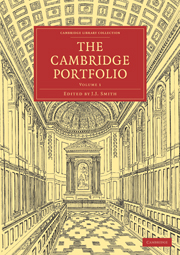Book contents
- Frontmatter
- DIRECTIONS FOR PLACING THE PLATES
- DESCRIPTION OF THE WOODCUTS
- LIST OF SIGNATURES
- ERRATA
- PREFACE
- INTRODUCTORY
- THE FIRST MILESTONE FROM CAMBRIDGE
- THE APPROACH AND PRINCIPAL AVENUE
- THE WALKS
- THE INSTALLATION IN 1835
- SOURCES OF HISTORY. I
- SOURCES OF HISTORY. II; COLLEGE HISTORIES
- A DREAM OF THE POETS
- MEMORIAL OF GONVILLE AND CAIUS COLLEGE
- FOVNDERS. I
- THE BOTANICAL GARDEN
- THE GOGMAGOGS
- TRINITY COLLEGE CHAPEL
- ON THE ANCIENT AMUSEMENTS OF THE UNIVERSITY
- A LEGEND OF THE HILLS
- SIGHED ON KING'S BRIDGE. OCT. 1838
- THE CAMBRIDGE PHILOSOPHICAL SOCIETY
- MUSEUM OF THE CAMBRIDGE PHILOSOPHICAL SOCIETY
- NOTICE OF WILLUGHBY
- THE BOAT-RACE
- NEVILLE'S COURT
- CRITIQUE ON GRAY
- AN INDEPENDENT TRIBUTE TO THE MEMORY OF THE RIGHT HON WILLIAM PITT
- SOURCES OF HISTORY. III: PRIVATE COLLECTIONS
- FOVNDERS. II
- PORTRAITURE OF DR. CAIUS
- THE UNION DEBATING SOCIETY
- ALABASTER
- CLARE HALL
- ORGANS
- POSTSCRIPT TO THE LEGEND OF THE HILLS
- ANECDOTES
- MILTON'S MULBERRY TREE
- BIOGRAPHICAL NOTICES
- The Cambridge Portfolio pp. 216-236
- VOCABULARY. I
- DR. LEGGE
- READING PARTIES
- THE CAM
- ANCIENT BRICK
- THE WOODWARDIAN MUSEUM
- THE COLLEGE COURSE
- THE CLUBS OF CAMBRIDGE
- OLD PLATE
- THE GARDEN AND COURTS OF GONVILLE AND CAIUS COLLEGE
- Plate section
VOCABULARY. I
Published online by Cambridge University Press: 10 November 2010
- Frontmatter
- DIRECTIONS FOR PLACING THE PLATES
- DESCRIPTION OF THE WOODCUTS
- LIST OF SIGNATURES
- ERRATA
- PREFACE
- INTRODUCTORY
- THE FIRST MILESTONE FROM CAMBRIDGE
- THE APPROACH AND PRINCIPAL AVENUE
- THE WALKS
- THE INSTALLATION IN 1835
- SOURCES OF HISTORY. I
- SOURCES OF HISTORY. II; COLLEGE HISTORIES
- A DREAM OF THE POETS
- MEMORIAL OF GONVILLE AND CAIUS COLLEGE
- FOVNDERS. I
- THE BOTANICAL GARDEN
- THE GOGMAGOGS
- TRINITY COLLEGE CHAPEL
- ON THE ANCIENT AMUSEMENTS OF THE UNIVERSITY
- A LEGEND OF THE HILLS
- SIGHED ON KING'S BRIDGE. OCT. 1838
- THE CAMBRIDGE PHILOSOPHICAL SOCIETY
- MUSEUM OF THE CAMBRIDGE PHILOSOPHICAL SOCIETY
- NOTICE OF WILLUGHBY
- THE BOAT-RACE
- NEVILLE'S COURT
- CRITIQUE ON GRAY
- AN INDEPENDENT TRIBUTE TO THE MEMORY OF THE RIGHT HON WILLIAM PITT
- SOURCES OF HISTORY. III: PRIVATE COLLECTIONS
- FOVNDERS. II
- PORTRAITURE OF DR. CAIUS
- THE UNION DEBATING SOCIETY
- ALABASTER
- CLARE HALL
- ORGANS
- POSTSCRIPT TO THE LEGEND OF THE HILLS
- ANECDOTES
- MILTON'S MULBERRY TREE
- BIOGRAPHICAL NOTICES
- The Cambridge Portfolio pp. 216-236
- VOCABULARY. I
- DR. LEGGE
- READING PARTIES
- THE CAM
- ANCIENT BRICK
- THE WOODWARDIAN MUSEUM
- THE COLLEGE COURSE
- THE CLUBS OF CAMBRIDGE
- OLD PLATE
- THE GARDEN AND COURTS OF GONVILLE AND CAIUS COLLEGE
- Plate section
Summary
By the contents of a MS. found in the Library of Jesus College this title was suggested, under which we proceed to offer details principally drawn thence respecting certain words which are peculiar to the University and which involve points of its system, or customs at present in force or dropped. And we hope that this information may possess interest and value for many who have looked on some of these points as unmeaning, and passed through the practice depending upon them with the impatience that would naturally be excited by restraints whose purpose was not seen and supposed therefore to have no existence.
First shall be introduced a set of terms appropriated to persons. In the account of these it will be seen how Offices, and the powers and privileges attached to them, grow up gradually out of necessity and from wants felt by the body; and are modified by altering improving enlarging and consolidating, in the lapse of time, by the effect of custom, by the result of carelessness or the effort of precaution.
Rector— the ancient title of the Governor of the University. The name is still borne by the chief officer in Foreign Universities. We are also familiar with the term in application to the Universities of Scotland. Hence in the vacancy of the Vice-Chancellorship (which is during one day in every year) the Proctors are sometimes mentioned with the title Rectores.
- Type
- Chapter
- Information
- The Cambridge Portfolio , pp. 237 - 246Publisher: Cambridge University PressPrint publication year: 2010First published in: 1840

